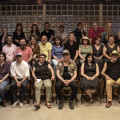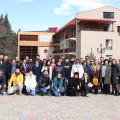Do you consider the First Artsakh War, which ended with the victory of the Armenian side, to be sufficiently reflected in our literature? To what extent does the young generation know about this war and our victory?
I graduated from high school 4 years ago and I remember well how the topic of the War and any national issue was taught to me and my classmates in a very dry and one-sided way, blended with a large dose of pathos, which immediately evoked distaste in us and kept us from any further in-depth study. We were not caught unawares, because on any mention of the War, our teachers would always say that we only had a ceasefire in place and that military operations could be launched at any moment. But, at the same time, that romantic approach to war did not allow us to feel the reality in a more palpable manner.
What myths did this recent Artsakh War destroy for you as a journalist?
As a journalist, I learned to take even the most sacred of “truths” with a pinch of salt and I revised my previous perceptions of the concept of authority.
What thoughts were born as a result of the Second Artsakh War and the defeat we suffered?
From the very first day of the War, I realized that I had to do something that was more useful, and not to dive into music (at the time, I had plans to do more work as a music critic). Because everything and everyone suffers as a result of war, I decided to study the natural sciences, particularly biology and the environment, so that I could report on issues related to natural ecosystems and fauna in Armenia. After the defeat, these thoughts grew stronger.
There have been attempts to establish relations with Turkey during the rule of all three past Presidents of Armenia. Why did Turkey break its neutrality during the Second Artsakh War?
Perhaps the decisive factor was that the global recognition of the Armenian Genocide had become the primary objective of foreign policy. Naturally, it should be among the top issues of the foreign policy agenda but, somehow, we should consider how achieving the global condemnation of the Genocide could lead to a freeze on any possible relations with Turkey, which has great influence on the stability in the region.
As a jounralist and an intellectual, how do you see your own mission when it comes to fostering reconciliation between these peoples and the establishment of good relations with neighbors?
Even now, there is a readiness for good neighborly relations and reconciliation between the peoples, in the same way as how Armenians and Russians marry and live happily together abroad, in other countries. Ideally, there should be platforms that would allow Armenians and Azerbaijanis to come into direct dialogue with each other, without the intervention of their governments. I can say for myself that I would like to find ways to work together with Azerbaijani journalists in my own area of activity, because we have common problems, particularly when it comes to the environment, which deserve to be at the focus of international and local attention. I would like to see a lot of such specialized communication on issues that “go beyond borders”.



